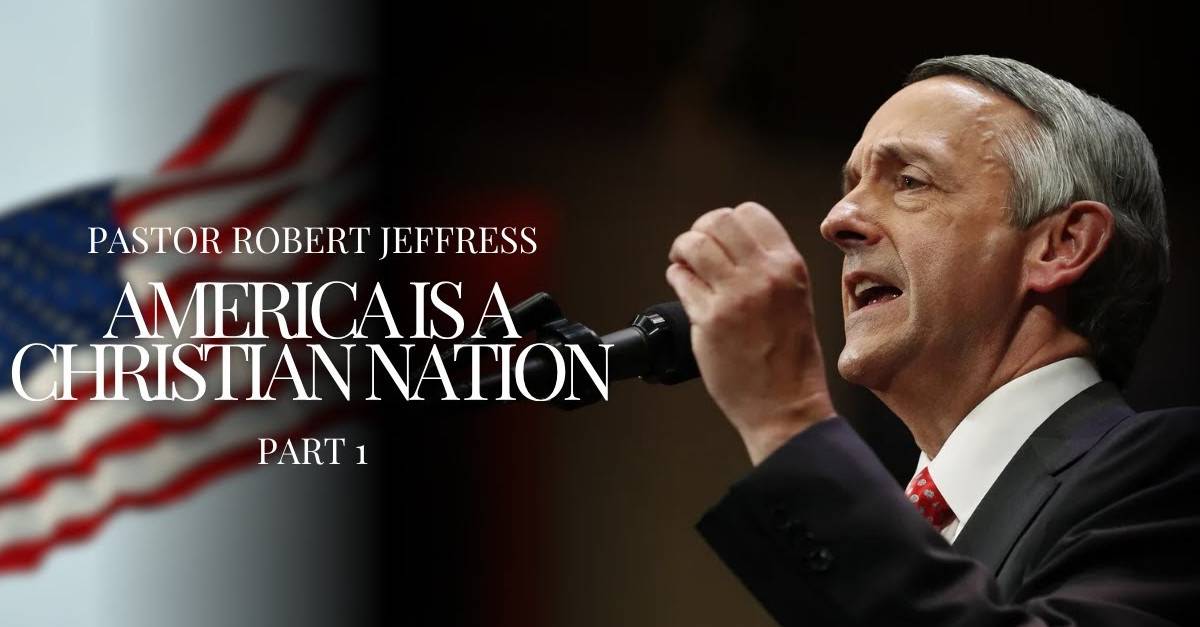Read Textual Sermon from Robert Jeffress
Myth vs. History
Listen long enough to the arguments of the American Civil Liberties Union or the Freedom From Religion Foundation or other left-wing groups, and you will come to believe this version of America’s history: you’ll come to believe that America was founded by a wide diversity of people from many different faiths—some deists, some atheists, and yes, a few Christians—whose one goal was to build a completely secular nation devoid of any religious, especially Christian, influence whatsoever. You’ll be told our founders wanted to erect an unscalable wall around our country that would keep any spiritual influence from seeping into public life.
That version of American history belongs in the same category as the story of George Washington and the cherry tree. It is an absolute myth. As we’re going to discover today, the truth is America was founded primarily— not exclusively— by orthodox Christians. And they founded this country upon the unchanging foundation of God’s eternal truth. Furthermore, our founders believed that our success as a nation depended upon our faithfulness to God’s eternal Word. Though it is completely politically incorrect to say, the truth is this: America was founded as a Christian nation, and our success as a nation depends upon our fidelity to God’s Word.
“Except the LORD build the house, they labour in vain that build it.” (Psalm 127:1, KJV)
The Founders’ Spiritual Beliefs
Now, let’s look at the historical evidence. First, the spiritual beliefs of our founders. Were they neutral toward Christianity? Hardly. Fifty-two of the fifty-five men who attended the Constitutional Convention were orthodox, conservative Christians. In fact, two of those founders—Elias Boudinot and John Jay, the first Chief Justice of our Supreme Court—later went on to be heads of the American Bible Society, whose purpose was to distribute the Bible as widely as possible, believing its message would transform lives and set the nation on a proper moral course.
Yes, two of our founders were deists—Thomas Jefferson and Benjamin Franklin—and make no mistake about it, deists are not Christians. But even these men understood the importance of a spiritual foundation for our country. Jefferson and Franklin worked together to propose a national seal depicting Moses leading Israel out of Egypt, following God in the pillar of cloud. Franklin believed the Continental Congress should begin its sessions seeking the favor of God through prayer:
“I have lived, Sir, a long time, and the longer I live the more convincing proofs I see of this truth—that God governs in the affairs of men; and if a sparrow cannot fall to the ground without His notice, is it probable that an empire can rise without His aid? … Except the Lord build, they labor in vain that build it.” —Benjamin Franklin
Consider also the state constitutions. Almost all of the thirteen colonies prior to the Convention had state-sponsored religion, which shows up in qualifications for office. For example, Article 22 of the Delaware Constitution required officeholders to declare: “I do profess faith in God the Father and in Jesus Christ His only Son, and in the Holy Ghost, one God, blessed forevermore; and I do acknowledge the Holy Scriptures of the Old and New Testament to be given by divine inspiration.”
Hear George Washington in his first inaugural: it would be improper to omit, in this first official act, his fervent supplications to the Almighty Being. John Adams said, “The general principles on which the fathers achieved independence were the general principles of Christianity… I then believed and now believe that those general principles of Christianity are as eternal and immutable as the existence and attributes of God.” He also observed, “Our Constitution was made only for a moral and religious people. It is wholly inadequate to the government of any other.” John Jay wrote, “Providence has given to our people the choice of their rulers; and it is the duty, as well as the privilege and interest, of our Christian nation to select and prefer Christians for their rulers.”
John Quincy Adams, our sixth president, asked: “Why is it that next to the birthday of the Savior of the world, your most joyous and most venerated festival returns this day, July 4?” He linked the birthday of the nation with the mission of the Redeemer and spoke of an indissoluble bond between civil government and the precepts of Christianity.
“Blessed is the nation whose God is the LORD, the people He has chosen as His own inheritance.” (Psalm 33:12, NKJV)
“Separation of Church and State” in Context
“What about the wall of separation between church and state?” That phrase is not in the Constitution. The First Amendment says, “Congress shall make no law respecting an establishment of religion, or prohibiting the free exercise thereof.” The famous phrase appears in a private 1802 letter from President Thomas Jefferson to the Danbury Baptists. The context? In several states—Connecticut included—tax dollars supported a state-preferred Christian denomination (in Connecticut, the Congregational Church). The Baptists objected to being coerced to fund another denomination. Jefferson affirmed the First Amendment, speaking of “a wall of separation between church and state”—meaning no national church and no elevation of one Christian denomination over another, not a banishment of faith from public life.
“Righteousness exalts a nation, but sin is a reproach to any people.” (Proverbs 14:34, NKJV)
Early Court Rulings and Public Christianity
Early courts reflected this understanding. In Runkel v. Winemiller (Maryland, 1799), the court noted: “By our form of government, the Christian religion is the established religion; and all sects and denominations of Christians are placed upon the same equal footing.” Not the elevation of one sect, but recognition of Christianity’s grounding influence.
In Church of the Holy Trinity v. United States (1892), the U.S. Supreme Court wrote: “This is a religious people… These and many other matters which might be noticed add a volume of unofficial declarations to the mass of organic utterances that this is a Christian nation.”
Citing People v. Ruggles (N.Y.), the Court observed that the nation’s morality was “deeply engrafted upon Christianity.”
In Vidal v. Girard’s Executors (1844), the Supreme Court upheld a bequest for a school without clergy while affirming that the Bible—especially the New Testament—may be read and taught as divine revelation, its precepts and morality inculcated, without note or comment.
Justice Joseph Story, appointed in 1811 by James Madison, later wrote that the Establishment Clause was intended to prevent the elevation of one Christian denomination over another—not to make Christianity subservient to non-Christian faiths.
“You are the light of the world. A city that is set on a hill cannot be hidden.” (Matthew 5:14, NKJV)
Questions This Sermon Answers
- What historical evidence is cited to argue that America was founded on Christian principles?
- What did Jefferson mean by a “wall of separation,” and what did he not mean?
- How did early state constitutions and court rulings reflect a public role for Christianity?
- How did founders like Washington, Adams, Jay, and John Quincy Adams describe faith’s role in national life?
- What is the difference between banning a national church and banishing faith from the public square?
- Why do morality and religion matter for the durability of the Constitution?


